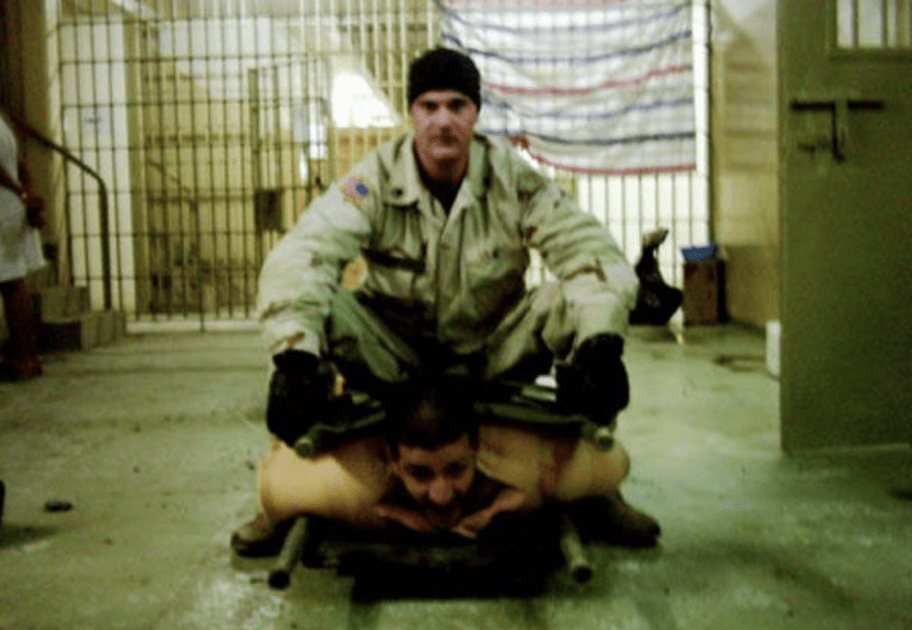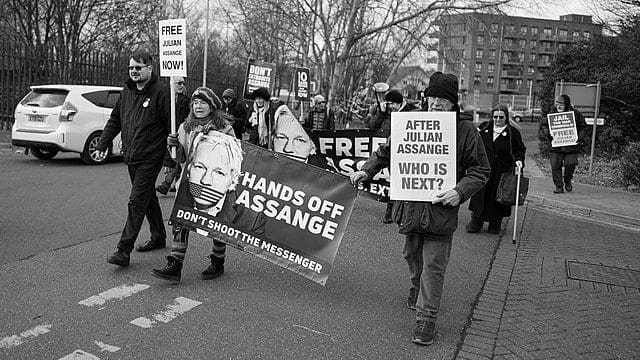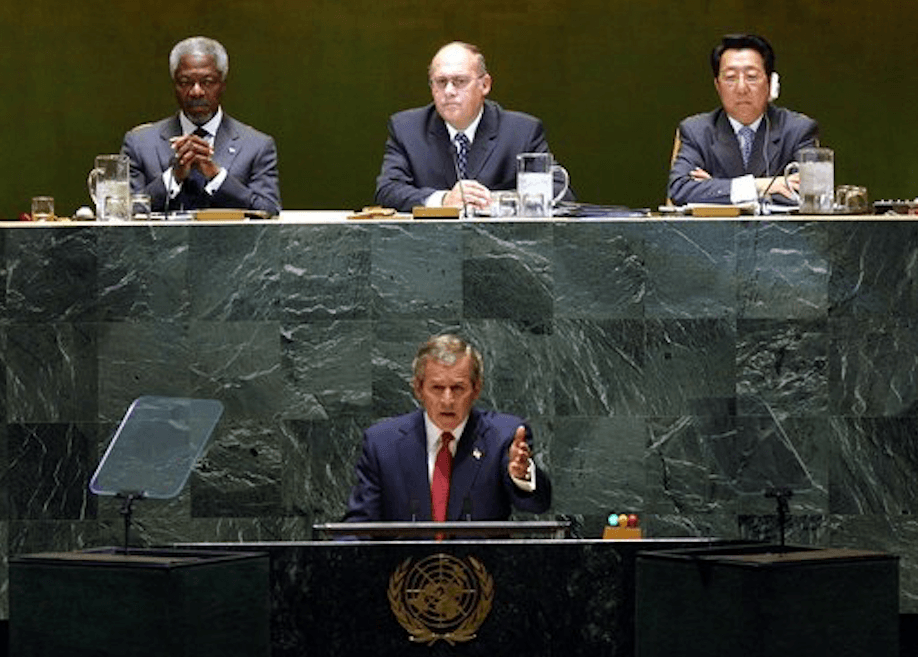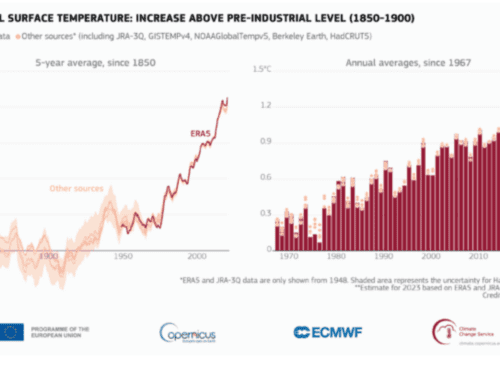

American Dream, Global Nightmare: On the Origins of the Iraq War


Sergeant Ivan Frederick sitting on an Iraqi detainee between two stretchers at Abu Ghraib prison.
Whether or not we continue to enforce a universal conception of human rights at moments of outrage and incomprehension, precisely when we think that others have taken themselves out of the human community as we know it, is a test of our very humanity.
– Judith Butler
One of the problems with commemorating the 20th anniversary of the Iraq War is that the Iraq War didn’t start 20 years ago. It had been going on for more than a decade before Shock and Awe. First there was Pappy’s Bush’s invasion, followed by Bill Clinton bombing Iraq once every three days of his 8-year term and ratcheting down a sanctions regime that squeezed the life out of more than one million Iraqis, nearly all civilians. Clinton found that there more efficient and secret ways to kill. Pretending that the Iraq War started with Bush and Cheney is politically convenient for liberals and Democrats, even though many of them voted for the Bush’s regime change war (before they voted against it, in Kerry’s words). Even Bernie Sanders supported the Iraq War when Clinton was doing the bombing and imposing starvation on children, voting three times for the overthrow of Saddam as the “independent socialist member of Congress from Vermont.
So when did the Iraq war start? When Pappy Bush assembled an invasion force in Kuwait? Or was it when new US ambassador to Iraq April Glaspie met with Saddam on July 25, 1990 and laid a trap by contending: “We have no opinion on the Arab-Arab conflicts, like your border disagreement with Kuwait. I was in the American Embassy in Kuwait during the late 1960s. The instruction we had during this period was that we should express no opinion on this issue and that the issue is not associated with America. James Baker has directed our official spokesmen to emphasize this instruction.”
One can go back to 1983 when Donald Rumsfeld, acting as Reagan’s special envoy in the Middle East, promised Saddam support during the internecine Iran-Iraq war, which left more than 1.3 million dead. Or did it begin 20 years earlier with the CIA’s involvement in the Ramadan Coup of 1963, which led to the overthrow and execution of General Qasim and facilitated the rise of Saddam and the Baathist regime.
Of course, after World War II the Americans inherited Britain’s role as imperial master of the Middle East. As such one might credit the RAF’s Arthur “Bomber” Harris for establishing the precedent for Shock-and-Awe 70 years earlier with his prescription in 1936 for enforcing peace in the Middle East: “Drop one 250 pound or 500 pound bomb in each village that speaks out of turn. The only thing the Arab understands is the heavy hand and sooner or later it will have to be used.”
In the spring of 2003, Alexander Cockburn asked me to try and answer this question in an essay for CounterPunch. (Cockburn, as he so often did, had other pressing deadlines.) I pounded out a 3500 word piece, which later became the precis for our book, Imperial Crusades. I read the original version again this week for the first time in nearly 20 years and despite the fact that there was much we didn’t know at the time, it still stands up fairly well.
The “war”–officially designated by the US government as such and inaugurated with the “decapitation” strike of March 19, 2003–was really only a change of tempo in the overall war on Iraq, commenced with the sanctions imposed by the UN and by a separate US blockade in August of 1990, stretching through the first “hot” attack January 16, 1991 on through the next twelve years. 1990-2003: a long war, and a terrible one for the Iraqi people.
On April 3, 1991, the UN Security Council approved Resolution 687, the so-called mother of all resolutions, setting up the sanctions committee, dominated by the United States.
It is vital to understand that the first “hot” Gulf War was waged as much against the people of Iraq as against the Republican Guard. The US and its allies destroyed Iraq’s water, sewage and water-purification systems and electrical grid. Nearly every bridge across the Tigris and Euphrates was demolished. They struck 28 hospitals and destroyed 38 schools. They hit all eight of Iraq’s large hydropower dams. They attacked grain storage silos and irrigation systems.
Farmlands near Basra were inundated with saltwater from allied attacks. More than 95 percent of Iraq’s poultry farms were destroyed, as were 3.5 million sheep and more than 2 million cows. They bombed textile plants, cement factories and oil refineries, pipelines and storage facilities, all of which contributed to an environmental and economic nightmare that has continued nearly unabated over the 12 years. When confronted by the press with reports of Iraqi women carting home buckets of filthy water from the Tigris River, itself contaminated with raw sewage from the bombed treatment plants, an American general shrugged his shoulders and said, “People say, ‘You didn’t recognize that the bombing was going to have an effect on water and sewage.’ Well, what were we trying to do with sanctions: help out the Iraqi people? What we were doing with the attacks on the infrastructure was to accelerate the effect of the sanctions.”
After this first “hot” war in early 1991, with Iraq’s civilian and military infrastructure in ruins, the sanctions returned, as an invisible army of what we could call “external occupation”, with a vise grip: the intent was to keep Iraq from rebuilding not only its army but the foundations of its economy and society.
Despite the efforts of outfits such as Voices in the Wilderness, embargoes don’t draw the same attention as salvoes of cruise missiles or showers of cluster bombs. But they’re infinitely more deadly and the perpetrators and executives deserve to end up on trial as war criminals, as surely as any targeting officer in the Pentagon.
By 1998, UN officials working Baghdad were arguing that the root cause of child mortality and other health problems was no longer simply lack of food and medicine but lack of clean water (freely available in all parts of Iraq prior to the Gulf War) and of electrical power, now running at only 30 percent of the pre-bombing level, with consequences for hospitals and water-pumping systems that can be all too readily imagined.
Many of the contracts vetoed at the insistence of the US by the Sanctions Committee were integral to the repair of water and sewage systems. By some estimates, the bombings from the Gulf War inflicted nearly $200 billion worth of damage to the civilian infrastructure of Iraq. “Basically, anything with chemicals or even pumps is liable to get thrown out,” one UN official revealed.
The sanctions, then, served as a pretext to bring this hidden war home to the Iraqi people, to “soften them up” from the inside, as one Pentagon official put it. The same trend was apparent in the power supply sector, where around 25 percent of the contracts were vetoed. This meant not only homes were without power, but also hospitals, schools, the infrastructure of everyday life.
But even this doesn’t tell the whole story. UN officials referred to the “complementarity issue,” meaning that items approved for purchase would be useless without other items that had been vetoed. For example, (as CounterPunch reported at the time) the Iraqi Ministry of Health ordered $25 million worth of dentist chairs. This order was approved by the sanctions committee, except for the compressors, without which the chairs were useless and consequently gathered dust in a Baghdad warehouse.
These vetoes served as a constant harassment, even over petty issues. In February 2000, the US moved to prevent Iraq from importing 15 bulls from France. The excuse was that the animals, ordered with the blessing of the UN’s humanitarian office in Baghdad to try to restock the Iraqi beef industry, would require certain vaccines which (who knows) might be diverted into a program to make biological weapons of mass destruction.
For sheer sadistic bloody-mindedness, however, the interdiction of the bulls pales beside an initiative of the British government, which banned the export of vaccines for tetanus, diphtheria and yellow fever on the grounds that they too might find their way into the hands of Saddam’s biological weaponeers. It has been the self-exculpatory mantra of US and British officials that “food and medicine are exempt from sanctions.” As the vaccine ban shows, this, like so many other pronouncements on Iraq, turns out to be a lie.
Indeed, the sanctions policy was always marked by acts of captious cruelty. Since 1991, the US and Britain slapped their veto on requests by Iraq for: infant food; ping pong balls; NCR computers for children’s hospitals for blood analysis; heaters; insecticide; syringes; bicycles; nail polish and lipstick; tennis balls, children’s clothes, pencil sharpeners and school notebooks; cotton balls and swabs; hospital and ambulance radios and pagers; and shroud material.
The prolonged onslaught on the Iraqi people by the sanctions did not mean that direct military attack stopped in March of 1991. Indeed, though it received scant attention in the press, Iraq was hit with bombs or missiles an average of every three days since the cease-fire that purportedly signaled the end of the first Gulf War. Its feeble air defense system was shattered and its radars jammed and bombed; its air force was grounded, the runways of its airports repeatedly cratered; its Navy, primitive to begin with, was destroyed. The nation’s northern and southern territories were occupied by hostile forces, armed, funded and overseen by the CIA.
Every bit of new construction in the country was scrutinized for any possible military function by satellite cameras capable of zooming down to a square meter. Truck and tank convoys were zealously monitored. Troop locations were pinpointed. Its bunkers were mapped, the coordinates programmed into the targeting software for bunker- busting bombs.
Iraq after the Gulf War wasn’t a rogue state. It was a captive state. This daily military harassment was the normal state of play, but there were also more robust displays of power. In June of 1993, Bill Clinton okayed a cruise missile strike on Baghdad, supposedly in response to a alleged and certainly bungled bid by Iraqi agents to assassinate George Bush the first on his triumphal tour of Kuwait.
Twenty-three cruise missiles were launched on Baghdad from two aircraft carriers in the Persian Gulf. With deadly imprecision, 8 of the missiles hit a residential suburb of Baghdad, killing dozens of civilians, including one of Iraq’s leading artists, Leila al-Attar.
Then in December of 1998, another raid on Baghdad was launched, slated to divert attention from the House of Representatives’ vote on the question of Clinton’s impeachment. This time more than 100 missiles rained down on Baghdad, Mosul, Tikrit and Basra, killing hundreds. Clinton’s chief pollster, Stan Greenberg, imparted the welcome news that the bombings had caused Clinton’s poll numbers to jump by 11 points. When in doubt, bomb Iraq.
The message was not lost on Bush.
In late February of 2001, less than a month into office, Bush let fly with two dozen cruise missiles on Baghdad, a strike that Donald Rumsfeld described as an “act of protective retaliation.” Alongside these attacks the CIA was busy sponsoring assassination bids and, with sometimes comical inefficiency, trying to mount coups against Saddam Hussein.
After five years of sanctions Iraq was in desperate straits. The hospitals filled with dying children, and necessary medicines to save them banned by the US officials in New York supervising the operations of the sanctions committee. Half a million children had died in the time span. The mortality rates were soaring with terrifying speed. In 1989 the infant mortality rate had gone from 47 per 1000 in 1989 to 108 per 1000 in 1996. For kids under five the rate was even worse, from 56 per 1000 in 1989 to 131 per 1000 in 1996. By 1996 the death count was running at 5,000 children a month, to which Madeleine Albright made the infamous comment, that “we think the price is worth it.”
+++
One might think this carefully planned and deadly onslaught on a civilian population, year after year, surely was retribution enough for Saddam’s invasion of Kuwait. But what allowed the ultra-hawks in Washington to press for another hot war on Iraq was Saddam’s personal survival as Iraqi dictator. Though the aims of the war party were much broader, the brazen survival of Saddam was always the pretext.
On July 8, 1996 the Institute for Advanced Strategic and Political Studies sent a strategy memo to Israel’s new prime minister, Benjamin Netanyahu. Grandly titled “A Clean Break: A New Strategy for Securing the Realm”, (the realm in this instance being Israel) the memorandum had among its sponsors several notorious Washington characters, some of them accused more than once down the years of being agents of influence for Israel, including them Richard Perle and Douglas Feith.
Among the recommendations for Netanyahu were these:
“roll-back some of [Israel’s] most dangerous threats. This implies a clean break from the slogan ‘comprehensive peace’ to a traditional concept of strategy based on balance of power…
“Change the nature of [Israel’s] relations with the Palestinians, including upholding the right of hot pursuit for self-defense into all Palestinian areas…
“Israel can shape its strategic environment, in cooperation with Turkey and Jordan, by weakening, containing, and even rolling back Syria. This effort can focus on removing Saddam Hussein from power in Iraq–an important Israeli strategic objective in its own right–as a means of foiling Syria’s regional ambitions.”
Within a few short months this strategy paper for Netanyahu was being recycled through the agency of a Washington slop shop called the Project for a New American Century, which was convened by William Kristol with infusions of cash from the rightwing Bradley Foundation.
The PNAC became a roosting spot for a retinue of DC neocons, headlined by Donald Rumsfeld, Dick Cheney and Paul Wolfowitz. On the eve of Clinton’s 1998 State of the Union address, Rumsfeld and Wolfowitz sent Clinton a letter on PNAC stationary urging the president to radically overhaul US policy toward Iraq.
Instead of the slow squeeze of sanction, Rumsfeld and Wolfowitz declared that it was time for Saddam to be forcibly evicted and Iraq reconstructed along lines favorable to US and Israeli interests. The UN be damned.
“We are writing you because we are convinced that current American policy toward Iraq is not succeeding, and that we may soon face a threat in the Middle East more serious than any we have known since the end of the Cold War,” the letter blared. “In your upcoming State of the Union Address, you have an opportunity to chart a clear and determined course for meeting this threat. We urge you to seize that opportunity, and to enunciate a new strategy that would secure the interests of the U.S. and our friends and allies around the world. That strategy should aim, above all, at the removal of Saddam Hussein’s regime from power….American policy cannot continue to be crippled by a misguided insistence on unanimity in the UN Security Council.”
In all likelihood, the strategy outlined in the letter was aimed not at Clinton, the lame-duck, but at Gore, who Wolfowitz, Rumsfeld et al. believed might be more receptive to this rhetoric. They had reason for hope. One of the PNAC’s members was James Woolsey, former CIA head and longtime Gore adviser on intelligence and military matters.
And it worked. As the campaign season rolled into action Gore began to distance himself from Clinton on Iraq. He embraced the corrupt Ahmad Chalabi and his Iraqi National Congress, indicted the Bush family for being soft on Saddam and called for regime topple.
Had Gore been elected he likely would have stepped up the tempo of military strikes on Iraq within weeks of taking office.
+++
After seizing power, the Bush crowd didn’t wait long to draw Iraqi blood. Less than a month after taking office, cruise missiles pummeled Baghdad, killing dozens of civilians. Then came the attacks of 9/11. Just hours into that day of disaster, Rumsfeld convened a meeting in the war room. He commanded his aides to get “best info fast. Judge whether good enough hit S.H.”—meaning Saddam Hussein— “at same time. Not only UBL”—the initials used to identify Osama bin Laden. “Go massive.” Notes taken by these aides quote him as saying. “Sweep it all up. Things related and not.” The notes were uncovered by David Martin of CBS News. The preparations for overthrowing Saddam began that day, under the pretense that Saddam was somehow connected to Bin Laden’s Wahabbite kamikazes. Rumsfeld knew then the connection was illusory and despite lots of bluster and digging it didn’t became any more substantial over the next year and a half.
In the months that preceded the second “hot” war, ignited on March 19, 2003, many a theory was advanced for the prime motive of the war party: was it the plan of the pro-Israel neocon hawks; was it all about oil and (a subvariant) because Saddam was insisting on being paid for his oil in euros; was it, in the wake of 9/11, about a peremptory message about US power (this is the current White House favorite); was it essentially a subject change from the domestic economic slump?
The answer is the essentially unconspiratorial one that it was a mix. Bush’s initial policy in his first fumbling months in office was far from the chest-pounding stance of implacable American might it became after 9/11 changed the rule book. 9/11 is what gave the neocons their chance, and allowed them to push forward and eventually trump the instincts of a hefty chunk of the political and corporate elites.
For many of these elites, the survival of Saddam Hussein was a small blip on the radar screen. Here’s a useful resume of what preoccupied these elites from Jeffrey Garten, who was Clinton’s first undersecretary of commerce for international trade, writing in Business Week:
“The biggest issues the Administration faced were not military in nature but competition with Japan and Europe, financial crises in Latin America and Asia, negotiations over the North American Trade Agreement, and the establishment of the World Trade Organization and China’s entrance into it. In Washington’s eyes, the policies of the IMF, the World Bank, and the WTO were bigger issues than the future of NATO. The opening of Japan’s markets was more critical than its military posture in Asia. The ratings that Standard & Poor’s gave to Indonesia was of greater significance than sending our military advisers there. We pushed deregulation and privatization. We mounted massive trade missions to help U.S. companies win big contracts in emerging markets. Strengthening economic globalization became the organizing principle for most of our foreign policy. And American corporations were de facto partners all along the way.”
That’s a fair account of how the agenda looks, from the imperial battlements. Run the show as best you can, but don’t rock the boat more than you have to. Acting too blatantly as prime world gangster, ’dissing the Security Council, roiling the Arab world, prompting popular upheavals in Turkey, all counted as boat-rocking on a dangerous scale.
By the end of half a year’s national debate on the utility of attacking Iraq, business leaders were still chewing their finger nails and trembling at the economic numbers; the New York Times was against war and George Jr had lost the support of his father, who issued a distinct rebuke during a question-and-answer session at Tufts in mid-spring. George Senior’s closest associates, James Baker and Brent Scowcroft similarly expressed disagreement.
But against this opposition, domestic political factors proved paramount and overwhelming. The post-9/11 climate offers the American right its greatest chance since the first days of the Reagan administration, maybe even since the early 1950s to set in blood and stone its core agenda: untrammeled exercise of power overseas, and at home roll-back of all liberal gains since the start of the New Deal. And not just that, but an opportunity too to make a lasting dent in the purchase on Jewish support and money held since Truman by the Democratic Party.
This much seems clear: US officials spent years knowingly making decisions that spelled certain death to hundreds of thousands of the poorest Iraqi civilians, living in the cradle of civilization, the bulk of them children.
+++
I’ve kept a collection of quotes about the Iraq war for years. Here’s a inventory of who said what and when, which provides a kind of oral history of the war (mostly) from the perpetrators’ point of view…
“An Iraqi defector who described himself as a civil engineer said he personally worked on renovations of secret facilities for biological, chemical and nuclear weapons in underground wells, private villas and under the Saddam Hussein Hospital in Baghdad as recently as a year ago.”
– Judith Miller, New York Times, December 20, 2001
“Support for Saddam, including within his military organization, will collapse after the first whiff of gunpowder.”
– Richard Perle, chair Pentagon Defense Policy Board, July 11, 2002
“Simply stated, there is no doubt that Saddam Hussein now has weapons of mass destruction.”
– Dick Cheney, August 26, 2002
“Every day Saddam remains in power with chemical weapons, biological weapons, and the development of nuclear weapons is a day of danger for the United States.”
– Sen. Joseph Lieberman, September 4, 2002
“If we wait for the danger to become clear, it could be too late.”
– Sen. Joseph Biden, September 4, 2002
“Speaking on the condition that neither he nor the country in which he was interviewed be identified, Ahmed al-Shemri, his pseudonym, said Iraq had continued developing, producing, and storing chemical agents at many mobile and fixed site throughout the country, many of them underground.
“All of Iraq is one large storage facility,” said Mr. Shemri.
– Judith Miller and Michael Gordon, New York Times, September 7, 2002
“Right now, Iraq is expanding and improving facilities that were used for the production of biological weapons.”
– George W. Bush, September 12, 2002
“I hereby declare before you that Iraq is clear of all nuclear, chemical and biological weapons.”
– Saddam Hussein in message to U.N. General Assembly, September 19, 2002
“I will be voting to give the President of the United States the authority to use force– if necessary– to disarm Saddam Hussein because I believe that a deadly arsenal of weapons of mass destruction in his hands is a real and grave threat to our security.”
– John Kerry, October 9, 2002
“The Gulf War in the 1990s lasted five days on the ground. I can’t tell you if the use of force in Iraq today would last five days, or five weeks or five months. But it certainly isn’t going to last any longer than that.”
– Donald Rumsfeld, November 14, 2002
“If he declares he has none, then we will know that Saddam Hussein is once again misleading the world.”
– Ari Fleischer, December 2, 2002
“The CIA is investigating an informant’s accusation that Iraq obtained a particularly virulent strain of smallpox from a Russian scientist who worked in a smallpox lab in Moscow during Soviet times.”
– Judith Miller, New York Times, December 3, 2002
“We know for a fact that there are weapons there.”
– Ari Fletcher, January 9, 2003
“His regime has large, unaccounted-for stockpiles of chemical and biological weapons, including VX, sarin, mustard gas, anthrax, botulism and possibly smallpox. And he has an active program to acquire and develop nuclear weapons.”
– Donald Rumsfeld, January 20, 2003
“Former Iraqi scientists have provided American intelligence officials with a portrait of Saddam Hussein’s secret program to develop and conceal chemical, biological and nuclear weapons that is starkly at odds with the findings so far of the United Nations weapons inspectors.”
– Judith Miller, New York Times, January 24, 2003
“Our intelligence officials estimate that Saddam Hussein had the materials to produce as much as 500 tons of sarin, mustard and VX nerve agent.”
– George W. Bush, January 28, 2003
“We know that Saddam Hussein is determined to keep his weapons of mass destruction, is determined to make more.”
– Colin Powell, February 5, 2003
‘My colleagues, every statement I make today is backed up by sources, solid sources. What we’re giving you are facts and conclusions based on solid intelligence.”
– Colin Powell, February 5, 2003
“Iraq both poses a continuing threat to the national security of the United States and international peace and security in the Persian Gulf region and remains in material and unacceptable breach of its international obligations by, among other things, continuing to possess and develop a significant chemical and biological weapons capability, actively seeking a nuclear weapons capability, and supporting and harboring terrorist organizations.”
– Sen. Hillary Clinton February 5, 2003
“We have sources that tell us that Saddam Hussein recently authorized Iraqi field commanders to use chemical weapons — the very weapons the dictator tells us he does not have.”
– George Bush, February 8, 2003
“So has the strategic decision been made to disarm Iraq of its weapons of mass destruction by the leadership in Baghdad? I think our judgment has to be clearly not.”
– Colin Powell, March 8, 2003
“I think things have gotten so bad inside Iraq, from the standpoint of the Iraqi people, my belief is we will, in fact, be greeted as liberators.”
– Dick Cheney March 16, 2003
“Intelligence gathered by this and other governments leaves no doubt that the Iraq regime continues to possess and conceal some of the most lethal weapons ever devised.”
– George Bush, March 18, 2003
“We are asked to accept Saddam decided to destroy those weapons. I say that such a claim is palpably absurd.”
Tony Blair, Prime Minister March 18, 2003
“The criminal little Bush has committed a crime against humanity.”
– Saddam Hussein, March 20, 2003
“Well, there is no question that we have evidence and information that Iraq has weapons of mass destruction, biological and chemical particularly . . . all this will be made clear in the course of the operation, for whatever duration it takes.”
– Ari Fleisher, March 21, 2003
“There is no doubt that the regime of Saddam Hussein possesses weapons of mass destruction. As this operation continues, those weapons will be identified, found, along with the people who have produced them and who guard them.”
– Gen. Tommy Franks, March 22, 2003
“One of our top objectives is to find and destroy the WMD. There are a number of sites.”
– Victoria Clark, Pentagon Spokeswoman, March 22, 2003
“I have no doubt we’re going to find big stores of weapons of mass destruction.”
– Kenneth Adelman, Defense Policy Board, March 23, 2003
“We know where they are. They are in the area around Tikrit and Baghdad.”
– Donald Rumsfeld, March 30, 2003
“Saddam’s removal is necessary to eradicate the threat from his weapons of mass destruction.”
– Jack Straw, British Foreign Secretary, April 2, 2003
“Obviously the administration intends to publicize all the weapons of mass destruction U.S. forces find — and there will be plenty.”
– Robert Kagan, Neocon scholar, April 9, 2003
“I think you have always heard, and you continue to hear from officials, a measure of high confidence that, indeed, the weapons of mass destruction will be found.”
– Ari Fleischer, April 10, 2003
“Stuff happens.”
– Donald Rumsfeld, April 11, 2003
“We are learning more as we interrogate or have discussions with Iraqi scientists and people within the Iraqi structure, that perhaps he destroyed some, perhaps he dispersed some. And so we will find them.”
– George Bush, April 24, 2003
“There are people who in large measure have information that we need . . . so that we can track down the weapons of mass destruction in that country.”
– Donald Rumsfeld, April 25, 2003
“Before people crow about the absence of weapons of mass destruction, I suggest they wait a bit.”
Tony Blair, April 28, 2003
“Major combat operations in Iraq have ended. In the battle of Iraq, the United States and our allies have prevailed.”
– George W. Bush, May 1, 2003
“We’ll find them [WMDs]. It’ll be a matter of time to do so.”
– George Bush May 3, 2003
“I am confident that we will find evidence that makes it clear he had weapons of mass destruction.”
– Colin Powell, May 4, 2003
“I never believed that we’d just tumble over weapons of mass destruction in that country.”
– Donald Rumsfeld, May 4, 2003
“I’m not surprised if we begin to uncover the weapons program of Saddam Hussein — because he had a weapons program.”
George W. Bush, May 6, 2003
“U.S. officials never expected that “we were going to open garages and find” weapons of mass destruction.”
– Condoleezza Rice, May 12, 2003
“I just don’t know whether it was all destroyed years ago — I mean, there’s no question that there were chemical weapons years ago — whether they were destroyed right before the war, (or) whether they’re still hidden.”
– Maj. Gen. David Petraeus, Commander 101st Airborne May 13, 2003
“Before the war, there’s no doubt in my mind that Saddam Hussein had weapons of mass destruction, biological and chemical. I expected them to be found. I still expect them to be found.”
– Gen. Michael Hagee, Commandant of the Marine Corps May 21, 2003
“Given time, given the number of prisoners now that we’re interrogating, I’m confident that we’re going to find weapons of mass destruction.”
– Gen. Richard Myers, Chairman Joint Chiefs of Staff, May 26, 2003
“They may have had time to destroy them, and I don’t know the answer.”
– Donald Rumsfeld May 27, 2003
“For bureaucratic reasons, we settled on one issue, weapons of mass destruction (as justification for invading Iraq) because it was the one reason everyone could agree on.”
– Paul Wolfowitz, May 28, 2003
“He (Saddam) had long established ties with al Qaeda.”
– Dick Cheney, September 14, 2003
“They confined us like sheep. They hit people. They humiliated people.”
– Saad Naif, former prisoner at Abu Ghraib, November 1, 2003
“Numerous incidents of sadistic, blatant, and wanton criminal abuses were inflicted on several detainees. This systemic and illegal abuse of detainees was intentionally perpetrated by several members of the military police guard force.”
– Maj. General Antonio Taguba, February 2004
“I actually did vote for the $87 billion [to fund the invasion of Iraq] — before I voted against it.”
– John Kerry, March 16, 2004
– “The vast majority of the people in Abu Ghraib had no intelligence value whatsoever.”
– Brigadier General Janet Karpinski, April 7, 2004
– “What do I tell the people of Iraq? This is wrong. This is reprehensible. But this is not representative of the 150,000 soldiers that are over here. I’d say the same thing to the American people. Don’t judge your army based on the actions of a few.”
– Brigadier General Mark Kimmit, April 27, 2004
– “We had no support, no training whatsoever. And I kept asking my chain of command for certain things like rules and regulations, and it just wasn’t happening.”
– Staff Sergeant Ivan Frederick, one of the guards at Abu Ghraib
– It is important to recognize the differences between the war in Iraq and the war on terrorism. The treatment of those detained at Abu Ghraib is governed by the Geneva Conventions, which have been signed by both the U.S. and Iraq.”
– John Yoo, May 2004
“It’s the photographs that gives one the vivid impression of what took place.”
– Donald Rumsfeld, May 2004
– “American journalists and politicians made a perfect spectacle of themselves in discussing the Abu Ghraib prison controversy.”
– Tony Snow, May 2004
– “This is no different than what happens at the Skull and Bones initiation, and we’re going to ruin people’s lives over it and we’re going to hamper our military effort, and then we are going to really hammer them because they had a good time. You know, these people are being fired at every day. I’m talking about people having a good time, these people, you ever heard of emotional release? You ever heard of emotional release?”
– Rush Limbaugh, May 5, 2004
“I’m sorry, those pictures from the Abu Ghraib. At first, they, like infuriated me, I was sad. Then like, a couple days later, after they cut the guy’s head off, they didn’t seem like much. And now, I like to trade them with my friends.”
– Dennis Miller, May 2004
“This is an historic moment for Iraq, a day when Iraqis can hold their heads high because they are challenging the terrorists and starting to write their future with their own hands.”
– Iyad Allawi, Interim Prime Minister of Iraq, January 30, 2005
‘The intelligence community was absolutely uniform and uniformly wrong about the existence of weapons of mass destruction in Iraq).”
– Federal Judge Laurence Silberman, co-chair Commission on the Intelligence Capabilities, March 31, 2005
‘We are losing each day on average 50 to 60 people throughout the country, if not more. If this is not civil war, then God knows what civil war is.’
– Iyad Allawi, March 19, 2006
“I like to tell people when the final history is written on Iraq, it will look like just a comma because there is — my point is, there’s a strong will for democracy.”
– George W. Bush, September 23, 2006
‘It’s my responsibility to provide the American people with a candid assessment on the way forward. Absolutely, we’re winning.”
– George W. Bush, October 25, 2006
“We’re not winning. We’re not losing.”
– George W. Bush December 20, 2006
“There are American officials who consider Iraq as if it were one of their villages, for example Hillary Clinton and Carl Levin. I ask them to come back to their senses.”
–Nouri al-Maliki, Prime Minister of Iraq, August 26, 2007
“I tell folks all the time one way to train to conduct operations in Iraq is to watch the last season of the Sopranos. You get a sense of the conflict among like individuals.”
– Major-General Rick Lynch, commander of U.S. troops south of Baghdad November 16, 2007
“I get asked all the time ‘Do I feel guilty about what happened?’ the answer’s ‘No, I don’t.’ I’ve made the decision, the best decision I could make. It was important for the defense of our country, I knew going into war that somebody can get hurt that, but made whole decision so much graver. On the other hand, Laura and I have met hundreds who said ‘I would it again Mr. President.’”
– George W. Bush, 2017
Why Should They Go Out to Fight? They Leave That Role to the Poor
Booked Up
What I’m reading this week…
Bottoms Up and the Devil Laughs: a Journey Through the Deep State
Kerry Howley
(Knopf)
After Black Lives Matter: Policing and Anti-Capitalist Struggle
Cedric G. Johnson
(Verso)
Ignorance: a Global History
Peter Burke
(Yale)
Sound Grammar
What I’m listening to this week…
The Layers
Julian Lage
(Blue Note)
Ancient Future
Dwight Trible
(Gearbox)
Brothers and Sisters
Steve Mason
(Domino)
What We Call Progress
“A Klee painting named ‘Angelus Novus’ shows an angel looking as though he is about to move away from something he is fixedly contemplating. His eyes are staring, his mouth is open, his wings are spread. This is how one pictures the angel of history. His face is turned toward the past. Where we perceive a chain of events, he sees one single catastrophe which keeps piling wreckage upon wreckage and hurls it in front of his feet. The angel would like to stay, awaken the dead, and make whole what has been smashed. But a storm is blowing from Paradise; it has got caught in his wings with such violence that the angel can no longer close them. This storm irresistibly propels him into the future to which his back is turned, while the pile of debris before him grows skyward. This storm is what we call progress.”
– Walter Benjamin







